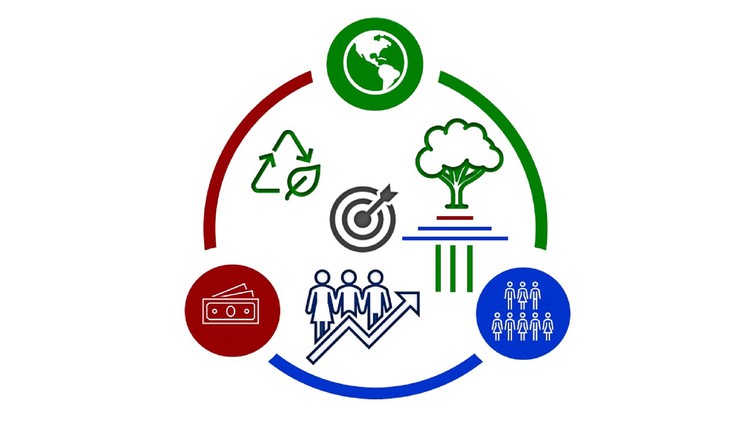
SDGs integration, ESG and value creation, and transforming into resilient business models for scaling business impact
What you will learn
Understand ESG and sustainability principles and their relevance to the value creation of your business.
Build your confidence in materiality analysis and stakeholder analysis to identify and prioritize ESG issues in your company to attract investors.
Advance your skills to develop sustainable strategies in business modelling with a focus on longterm value creation to deliver stakeholder value.
Develop your skills to integrate SDGs and circular economy principles with core business strategies, ESG program implementation and long-term value creation.
Be equipped to measure performance in corporate sustainability and ESG impact in your company and deliver customer value.
Enhance your capability in sustainability and ESG relevance analysis to develop strategic measures for business risk management and stakehold engagement.
Description
Winning business strategies are incredibly important to companies for scaling business impact and sustainability.
Stakeholders increasingly consider companies’ contribution to sustainable development when making decisions. Aligning ESG (Environmental, Social, and Governance) practices with the SDGs (Sustainable Development Goals) provides a clear narrative for investors and other stakeholders, demonstrating organizational commitment to addressing global challenges such as climate change, biodiversity loss, depletion of natural resources, poverty and social inequality, etc. and creating positive societal impact. Businesses aligning their strategies with the SDGs have a clear roadmap to address key global challenges, ensuring their actions contribute to broader societal and environmental goals.
Developing winning strategies in Corporate Sustainability and ESG involves a holistic approach that integrates ethical, social, and environmental considerations into business practices. Embedding the SDGs into purpose-driven organizations and ESG practices is essential for creating a positive impact, mitigating risks, fostering stakeholder engagement, and building a sustainable and resilient business model for a better future. By aligning with SDGs, companies can identify areas where innovation is most needed and create business models that address specific challenges and value creation.
The circular economy is integral to ESG considerations, value creation, and sustainable development by addressing environmental concerns, improving resource efficiency, fostering innovation, positively impacting social and governance aspects and transforming into resilient businesses. Embracing circular economy principles can position businesses as responsible, resilient, and forward-thinking contributors to a sustainable future.
By implementing these strategies, organizations can not only enhance their ESG performance but also create sustainable value for all stakeholders, fostering resilience and relevance in a rapidly evolving business landscape. Companies committed to sustainable development often enjoy a positive reputation and increased brand value. Consumers, investors, and other stakeholders are increasingly prioritizing ethical and sustainable practices, making it a key driver for attracting and retaining customers and investors.
Businesses must understand key environmental and societal risks and opportunities for long-term value creation.
The climate crisis is a huge business risk in this century. Climate change and environmental degradation are turning into a real operational challenge for many business organizations, from changing harvest periods and seasons that disrupt the operation of factories and production units, which results in shortages of products in the market. These disruptions affect the vulnerability of communities and a high risk of physical loss and damage. It may seriously interrupt supply chains to meet the demand in the market.
Transforming current businesses into resilient business models that address materiality issues and specific challenges are the greatest opportunities for long-term value creation. Integrating SDGs into core business strategies and ESG programs in business organizations enhances value creation in multiple ways. The SDGs provide a valuable framework for businesses to guide and measure their ESG practices, ultimately contributing to sustainable development and long-term value creation. Aligning ESG initiatives with specific SDGs helps businesses articulate their impact, manage risks, and position themselves as responsible contributors to global well-being.
Materiality analysis, stakeholder analysis, and stakeholder engagement are integral processes for purpose-driven organizations seeking to embed the SDGs. These processes ensure that sustainability efforts are strategically focused, aligned with stakeholder expectations, and implemented in a transparent and inclusive manner, aiming to contribute to sustainable development. Sustainable business model innovation is instrumental in implementing the SDGs in businesses. It provides a practical pathway for companies to contribute to global goals, address challenges, and create positive impacts on society, the environment, and the economy.
What skills do you need to develop winning strategies in Corporate Sustainability and ESG?
A combination of skills, knowledge, and commitment is required to develop winning strategies in corporate sustainability for long-term value creation. Creativity, imagination, and problem-solving skills are driving forces to transform business organizations for long-term success. The following competencies are critical. A deep understanding of sustainability and ESG principles and how they apply to business operations, capability to identify industry-specific sustainability challenges and opportunities, strong analytical skills to assess and interpret sustainability data, metrics, and key performance indicators, identify and assess sustainability risks (including specific ESG risks) and integrate them into overall risk management strategies, effective relationships with diverse stakeholders, materiality assessments to identify and prioritize the most relevant ESG issues, strategic thinking with a focus on long-term value creation, develop methodologies for measuring the impact and foster a culture of innovation to find sustainable solutions. This course will enable you to develop your skills and expand your knowledge horizon in the above areas. You will be able to upskill your capability in sustainability relevance analysis, develop strategic measures in business risk management, stakeholder engagement, sustainable business modelling, strategic thinking, and measuring impact to lead your organization.
Content